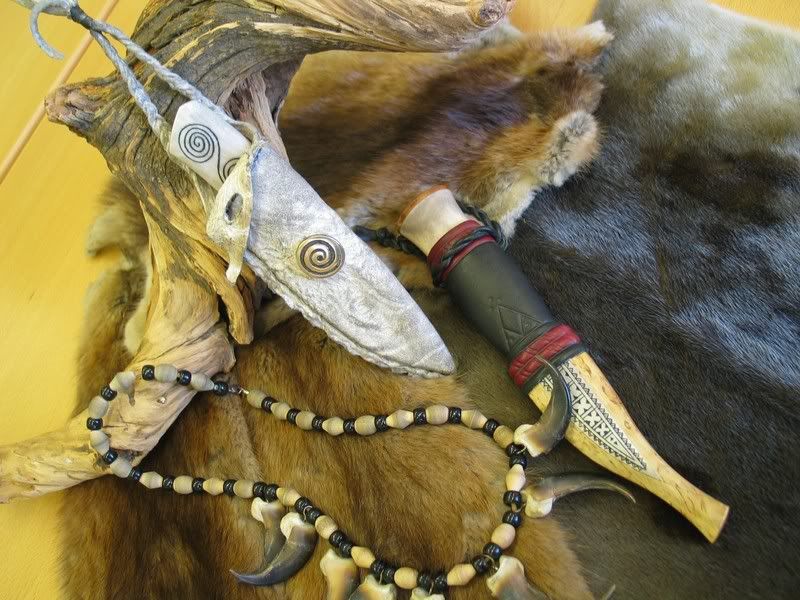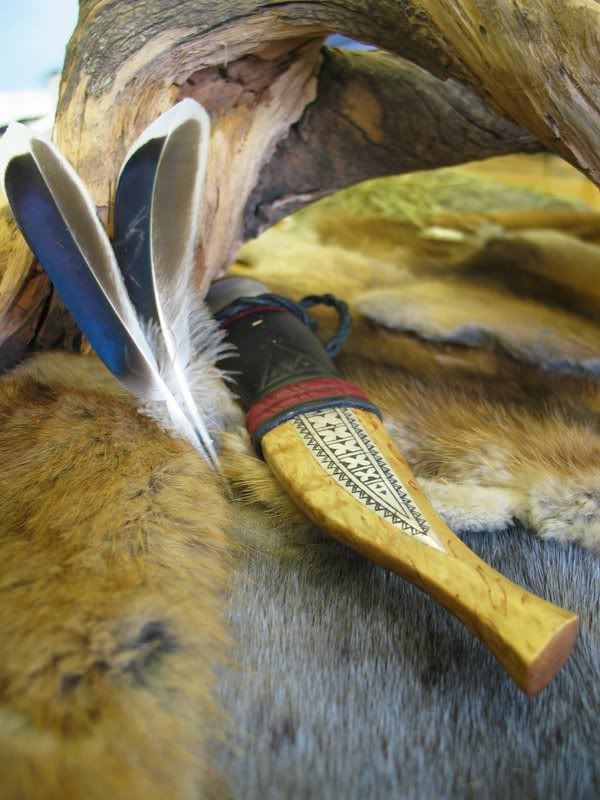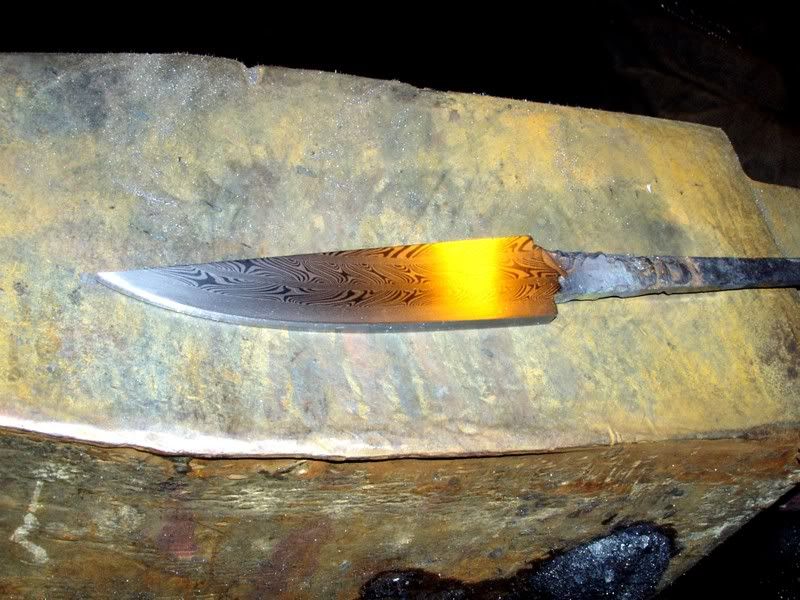
 |
|
|
|
|
#1 |
|
Member
Join Date: Dec 2004
Location: comfortably at home, USA
Posts: 432
|
Just got this. I think (?) an early Lapland Puukko. Sheath maybe
shoulder blade of small caribou? Blade is 3 " long. I think nice piece of folk art. Any and all comments appreciated. http://home.earthlink.net/~steinpic/lappuk.jpg Rich S |
|
|

|
|
|
#2 |
|
Member
Join Date: Mar 2005
Posts: 493
|
Rich,
Actually I think your blade is called a Saami. The Puukko is Finnish while the Saami is from Lapland. (I think that Saami means Lap.) Your hilt and sheath are probably reindeer antler. I believe Radu had started a thread on these blades a while back so he can probably answer all your questions. Sincerely, RobT |
|
|

|
|
|
#3 |
|
Member
Join Date: Dec 2004
Location: comfortably at home, USA
Posts: 432
|
I think you're right about the antler. Even a fetal caribou would have
a larger shoulder blade now that I think of it. I've been using "puukko" for most any Scandinavian knife (probably incorrectly). I suspect the blade is a commercial one rather than hand forged. I guess I'll have to start a Sammi collection to go with my Finnish puukko :-) Rich S |
|
|

|
|
|
#4 |
|
Member
Join Date: Sep 2005
Location: Finland
Posts: 3
|
This can be a Saami or Finnish puukko made by a laplander in Finland anyway.
Not all laplanders belong to the Saami culture. Beautiful since it´s truly handmade and you don´t see those very often even if living here in Finland. |
|
|

|
|
|
#5 |
|
Member
Join Date: Apr 2008
Posts: 235
|
Greetings.
just search for puukko threads here and noticed this one. Being a Finn I can verify that there is no such thing as a knife called "Saami". That is just the name of the original ethnic people who live in Lappland. The knife they use is a specimen of puukko with a heavier and longer blade than the usual puukko´s to be found in the southern parts of Finland. They are like this because they are used for multiple tasks like wood cutting and smashing the bones of killed reindeer. For that reason these knives are not so handy for little chores as the usual puukko and it aint unusual to see that there is a smaller puukko in the same sheath with the bigger knife for those small chores. Here we call the puukko of the Sami-people a "leuku". Here´s a pic where you can see the combo I mentioned earlier in the middle ones on the top row. Picture courtesy of Iisakki Järvenpää Oy 
|
|
|

|
|
|
#6 |
|
Member
Join Date: Mar 2005
Posts: 493
|
Hi Jussi M,
Perhaps in Finland these blades aren't called Saami but that is a commonly used term for them here in the States and, as I stated in my reply, I thought the name was that of the Lap people. You have been kind enough to tell us what the Finns call this Lapland knife (and provided examples of what I believe to be Finnish made interpretations of the type). Perhaps you could also let us know what the Laplanders call it? Sincerely, RobT |
|
|

|
|
|
#7 |
|
(deceased)
Join Date: Dec 2004
Location: East Coast USA
Posts: 3,191
|
Nice little knife. I just picked this up from a Finnish knife maker today.
Lew |
|
|

|
|
|
#8 | |
|
Member
Join Date: Dec 2004
Location: Sweden
Posts: 1,637
|
Quote:
There are 4 completely(!) different Sami-languages (South-, Torne-, Lule- and North-Sami) . So unfortunately there isn't any generic Sami name for the Sami knife. Of course you could agree to call it "Saami" in the US. But that's like us in Europe agreeing to call all Bowie knives "Cowboy". Which work fine between ourselves but maybe looks a bit strange on an international forum?  Also the Sami are living outside Lapland. Michael |
|
|
|

|
|
|
#9 | |
|
Member
Join Date: Apr 2008
Posts: 235
|
Quote:
thanks for your clarification, I´ll try my best. First of all you should know that I am far from being a puukko expert  With that in mind lets proceed. With that in mind lets proceed.First a few clarification regarding terms. - By Laplander I understand people who live in Lapland. Not all of them are Sami people as in general a Laplander here (speaking broadly of whole Finland now) means someone who is from and lives in the rural upper regions of our country. So, we have "regular" Laplanders and we have the Sami people who differ from the major population genetically, just like your Native Americans in USA. There are also both Swedish and Norwegian Laplanders and Sami people too. Getting back to the knives again, you wanted to know what the Sami people call their knives? In all honesty I can not tell you for sure if the below descriptions are 100% correct as they are gleamed from written Finnish sources and I do not speak any Saame nor do I personally know anyone who does. Nevertheless I believe these names to be correct. If not, I stand corrected. Please note that there are traditionally no middle size leukus as the middle sized knife would be lousy at all tasks: too small and light for acting as the cleaver a leuku is supposed to be and too bulky for being handy at small chores such as whittling. In the combos seen on the previous picture the small knives were all small enough to be used for small chores though they are not so handy as a "real" puukko that also come in Sami style (please see below)- Most of the leuku knives seen today are nothing more than souvenir for the typical tourists who would shun the right sized BIG knife and yet want a "real Lapland knife" not knowing what size it should be. Of course there is variation in size but the most typical leukus have circa 6-10 inch blades. FINNISH: Lapinpuukko = Laplanders puukko (often elaborately stylized) SAMI: "unna niiba"(also "buiku" which translates to puukko)    FINNISH: Leuku or Lapinleuku (the later phrase Lapinleuku means "Leuku of Lapland" emphasizing the fact that it is a Laplanders big knife, this meaning that it really is a big blade) SAMI: "stuorra niib" / "tuorraniib" ("stuorra" means big, "niib" means knife) I hope I answered your Question satisfactorily. As previously said I am not a puukko expert nor am I any expert regarding Sami - peoples nor laplanders culture in general. I wrote my initial response from the perspective of a Finn who lives in Southern Finland. It is not uncommon to have new names for things when they are studied outside of their original cultures. Hence we Finnish call the Sami -people´s knife a Leuku even though they use the name "stuorra niib". If collectors outside Finland call the same knife a "Sami knife" or what´ll have you makes no difference as long it is understood what is meant and not meant by the name, be the name original to the artifact or not. Thanks  Jussi |
|
|
|

|
|
|
#10 |
|
Member
Join Date: Mar 2005
Posts: 493
|
Hi VVV,
Given the wide spectrum of knives called Bowie, if in Europe there is a custom of calling single edge generally clip point blades with a cross guard that were used in the north American west Cowboy knives, it would be hard to argue against that convention. I have seen Mexican and Philippine clip point blades sold here in the States as Bowies. I have seen English blades made in the late 1800s called Bowies that have a false back edge in lieu of a clip point. I have seen modern custom made knives with Turkish clip points sold as Bowies. As far as I can see the only two features that a Bowie must have is a single edge and a cross guard. That guard can be oval, flat, or serpentine and, as mentioned above, the blade doesn't necessarily have to have a clip point. Hilts can be; round and encompass the tang, coffin shaped or straight scales, subhilt fighters, with or without pommels (of any shape), with bolsters or ferrules behind the guard, etc. Nobody here in the States seems to take exception to this vague categorization so I imagine north American collectors would simply say, "over in Europe they call Bowie knives Cowboy knives". It isn't the same case with the Lapland knife which has a much more tightly defined set of design parameters. So, if there are four groups of Saami people, I'll bet there are only four names for that knife and if the four groups speak the same language, I'd be surprised if there is more than one name for the knife. For my part, stuorra niib offered by Jussi M sounds good. Sincerely, RobT |
|
|

|
 |
|
|